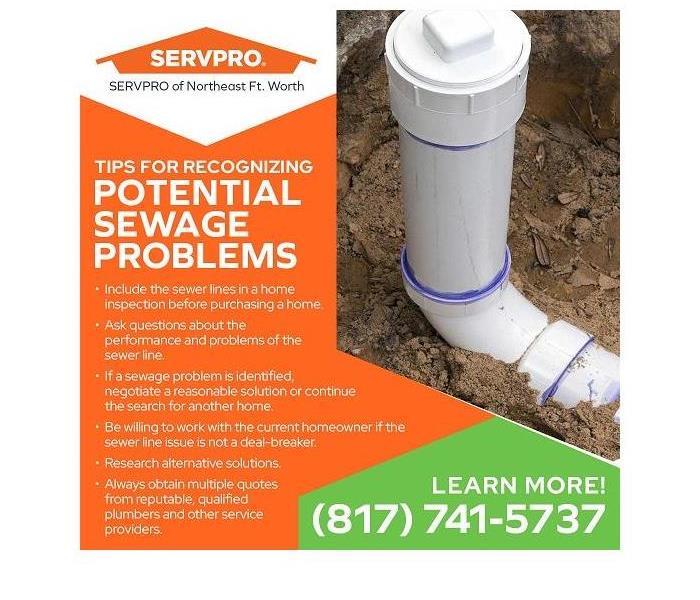How a Rapid Response from a Restoration Company Helps Decrease the Cost of a Sewage Cleanup
3/9/2022 (Permalink)
Blog Summary: Sewage damage can be very expensive, but by hiring a company that can implement a rapid response, homeowners can avoid secondary damage and minimize the overall cost to restore their homes.
The modern public sewer system makes it possible for many people to live in close proximity, but a system malfunction, severe weather, or drain blockage can result in a sewage backup necessitating sewage cleanup services. A sewage backup is inconvenient, messy, and unsanitary. Sewer line repairs can cost tens of thousands of dollars, and cleanup and restoration from a sewage backup in the basement or main living area can also cost thousands of dollars. Local homeowners in Watauga, TX, need to be aware of strategies for identifying and avoiding sewage issues.
Tips for Recognizing Potential Sewage Problems
Tip #1: Include the sewer lines in a home inspection before purchasing a home.
Before purchasing a home, the savvy buyer will have a professional carry out an inspection of the house from the roof to the foundation. If the home is not new construction, the sewage system should be carefully examined from the home to the main connection at the road. Any issues beyond the street connection are the responsibility of the utility company overseeing the mainline. Having a sewer inspection conducted prior to closing on the home could save tens of thousands of dollars once the deal is completed. A reputable, qualified plumber can scope from the mainline in the house to the connection with the municipal sewer in the street. This state-of-the-art camera technology offers homeowners and potential homebuyers an option to identify and assess any sewer line issues without having to dig. The high-tech solution reduces delays and requires no excavation.
Tip #2: Ask questions about the performance and problems of the sewer line.
Questions might include:
- What problems have occurred in the history of the home?
- How were these problems resolved?
- Have there been any recurrences of the same problems?
- What documentation is available about the problem?
- If a sewage spill occurred, is there documentation certifying that the cleanup and restoration process met industry standards and any municipal codes regarding sewage cleanup and restoration?
- Were the repairs a short-term or a long-term solution?
Tip #3: If a sewage problem is identified, negotiate a reasonable solution or continue the search for another home.
A sewage issue between the house and the road can be due to several factors. Tree roots may have punctured older clay pipes and clogged the system. Tree root intrusion can cause extensive damage and require large-scale excavation. If the sewage pipes are deep, the excavation work could cost tens of thousands of dollars.
Shifting earth, the weight of heavy equipment, or a nearby tree can cause an offset or collapse in the sewer pipes in the yard. Older homes may have terracotta pipes that degrade over time; in addition, aging pipes will crumble when stressed. Damaged pipes may still deliver raw sewage to the mainline at the street, but it is only a matter of time before the pipes collapse entirely or become clogged with dirt and roots.
Tip #4: Be willing to work with the current homeowner if the sewer line issue is not a deal-breaker.
The problems mentioned above may need extensive excavation that requires cosmetic landscaping after the repairs are completed. It may be that the homeowner will cover the heavy expenses of repairing the sewer lines if the prospective owner is willing to shoulder the burden of the landscaping.
Tip #5: Research alternative solutions.
Advances in plumbing technology may provide a very cost-effective, long-term solution that avoids excavation or expensive pipe replacement. One such solution is the installation of a sewer liner. The liner is a flexible tube coated with resin that hardens to form an additional layer within the pipe’s interior. The application inhibits the growth of tree roots in the system. While this option can be very expensive, it is less costly than an extensive excavation.
Tip #6: Always obtain multiple quotes from reputable, qualified plumbers and other service providers.
An inspection, assessment, and quote may or may not come with a fee, but they are priceless assets. The purchase of a home with severe plumbing and sewer damage and hidden water damage could be financially catastrophic for the new owner.
The severity of sewage damage underscores the necessity of prequalifying a reputable, certified, bonded, and insured damage restoration company. Listed below are some important questions to ask potential hires:
- Does the company guarantee a rapid response?
- Do technicians use the best and latest equipment?
- Are the technicians experienced, well-trained, and certified by the IICRC?
- Can the property damage restoration company handle the project from start to finish, including managing the insurance claims process?
- How do online reviews rate the company?
- Does the company have good references?
- In the event of a widespread disaster, can the team scale accordingly?
These are only a few points to consider when hiring a restoration and cleaning company, such as SERVPRO of Northeast Fort Worth. SERVPRO of Northeast Fort Worth offers a rapid response, 24/7, 365 days a year. The team uses the latest equipment, cutting-edge technology, and advanced cleaning techniques, and the company’s IICRC-certified technicians are some of the most highly trained professionals in the industry.
For more details about water damage restoration and sewage cleanup in Fort Worth, TX, and surrounding areas, email SERVPRO of Northeast Fort Worth at office@SERVPROnortheastftworth.com. The team of restoration and cleaning professionals can also be contacted by phone at (817) 741-5737.





 24/7 Emergency Service
24/7 Emergency Service
